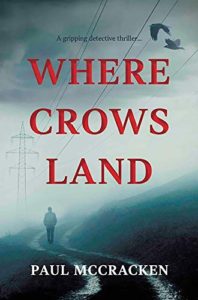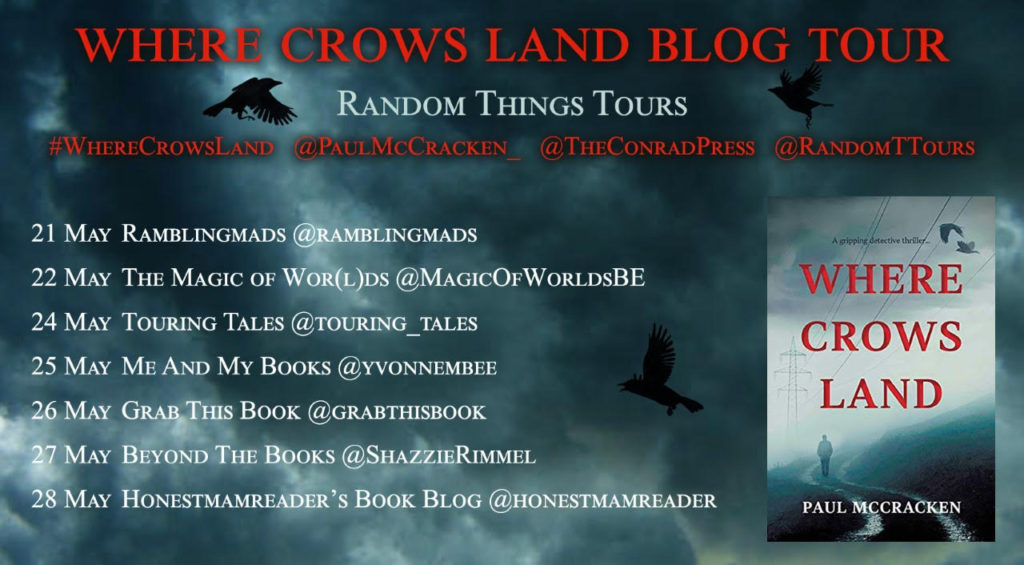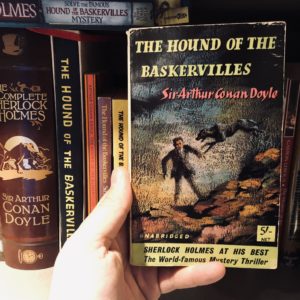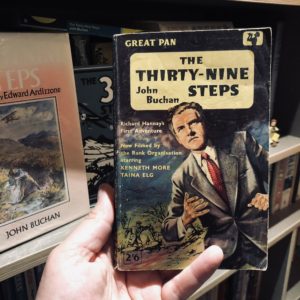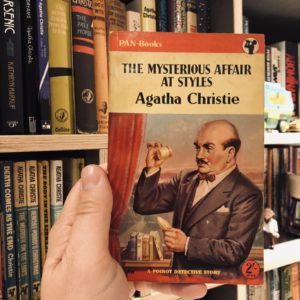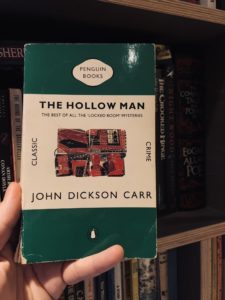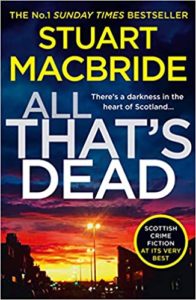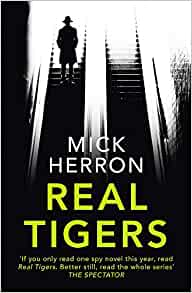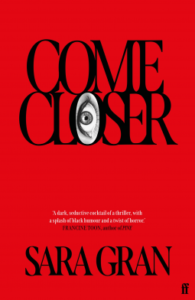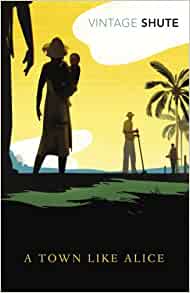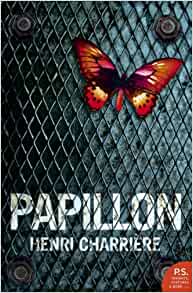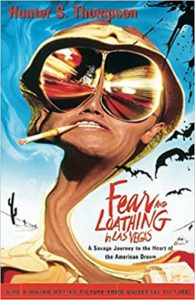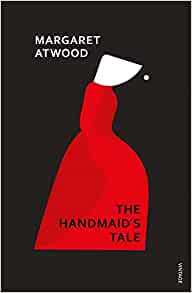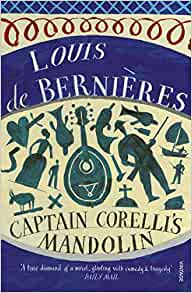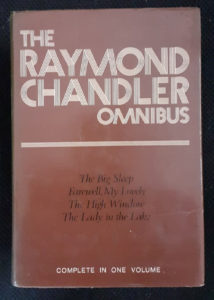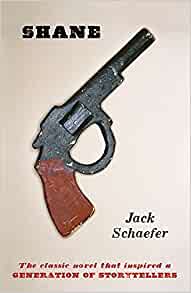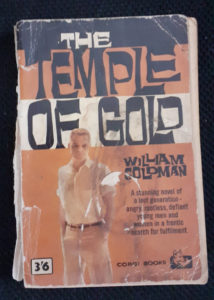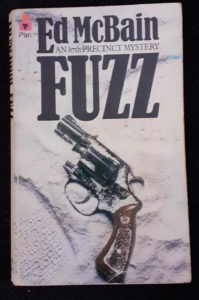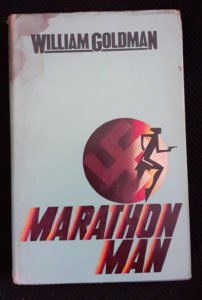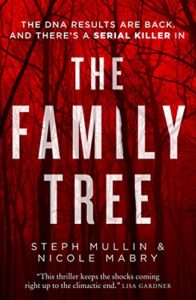This is Decades. Each week I invite a guest to select five books which they would want to see included in my Ultimate Library – the aim is to curate a new Library from the starting point of zero books and have the shelves bursting with terrific titles.
My guests are given two rules (which are often very well stretched as you will soon see):
Select ANY five books.
You may only select one book per decade pubished over five consecutive decades.
This is the sixteenth Decades post – all the books which have been selected thus far can be seen here: https://grabthisbook.net/?p=5113
If you are wondering why my introduction is shorter than usual it is because my guest this week has done all the heavy lifting for me. An utterly absorbing sequence of selections from Nicolás Obregón – I yield the floor.
DECADES
 Right, then. Hello. Who am I? Well, I’m Nicolás—pronounced Nico-lass, but everyone just calls me Nic anyway. I’m a British/Spanish dual-national, born in London, and I grew up between the two capitals. (My father is Spanish, my mother is French). In 2016, I moved to Los Angeles and have been grinning up at palm trees and wearing loud shirts ever since. I recently became an American citizen meaning that my passport draw now looks like it belongs to Jason Bourne.
Right, then. Hello. Who am I? Well, I’m Nicolás—pronounced Nico-lass, but everyone just calls me Nic anyway. I’m a British/Spanish dual-national, born in London, and I grew up between the two capitals. (My father is Spanish, my mother is French). In 2016, I moved to Los Angeles and have been grinning up at palm trees and wearing loud shirts ever since. I recently became an American citizen meaning that my passport draw now looks like it belongs to Jason Bourne.
More importantly, I’m the author of the Inspector Iwata series, a trilogy about a lonely Japanese detective—Blue Light Yokohama (2017), Sins As Scarlet (2018), Unknown Male (2019). Jeffery Deaver has called one of my books a masterpiece, while AJ Finn was left awestruck. A short story I wrote, Colibrí, appeared in the anthology BOTH SIDES: Stories from the Border (2020), which was recently nominated for an Anthony Award. Colibrí was labelled by Publishers Weekly as a poignant standout.
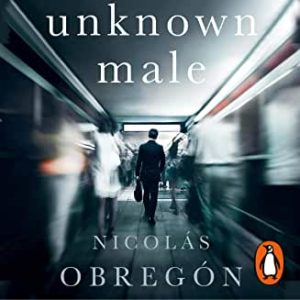 As for what I’m working on now, I’m at the business end of a third draft for my fourth (and first non-Iwata) book for Penguin/Michael Joseph, which I can’t talk too much about. I’m also in negotiations re: a true crime podcast that, you guessed it, I can’t say too much about. Finally, seeing as I live in Los Angeles, I plan to embrace the cliché and write a screenplay at the end of the year. But that’s enough about me, on to the good stuff!
As for what I’m working on now, I’m at the business end of a third draft for my fourth (and first non-Iwata) book for Penguin/Michael Joseph, which I can’t talk too much about. I’m also in negotiations re: a true crime podcast that, you guessed it, I can’t say too much about. Finally, seeing as I live in Los Angeles, I plan to embrace the cliché and write a screenplay at the end of the year. But that’s enough about me, on to the good stuff!
Now, initially, I tried to pick favourite books for Decades. But every time I thought I’d whittled my list down to five, I’d suddenly doubt everything—a deer caught in the headlights of all I was overlooking. Instead, I’ve gone for five books that have influenced me. And by that, I mean: books that have shaped me first as a reader, and then as an author. Without them, it’s not that I wouldn’t be half the writer I am today. It’s that I simply wouldn’t be one.
My thanks to Gordon for letting me submit myself to the delicious torture of picking five books across five consecutive decades.
Links to social media:
Twitter @NicObregon
Instagram @Obregonbooks
Facebook @Obregonbooks
www.nicolasobregon.com
2010s—Patria by Fernando Aramburu
 As a young child, I remember sleeping next to my father and being woken by a cataclysmic bang. He pulled me under the bed, swearing under his breath in Spanish: sons of bitches, sons of bitches. One of his friends growing up was murdered by ETA, a car bomb intended for the military father. To my dad, every ETA bomb, every gunshot, every death threat or extortion attempt was like a personal affront. His outrage, perhaps, helped him cope with the dread. But this didn’t make him unique.
As a young child, I remember sleeping next to my father and being woken by a cataclysmic bang. He pulled me under the bed, swearing under his breath in Spanish: sons of bitches, sons of bitches. One of his friends growing up was murdered by ETA, a car bomb intended for the military father. To my dad, every ETA bomb, every gunshot, every death threat or extortion attempt was like a personal affront. His outrage, perhaps, helped him cope with the dread. But this didn’t make him unique.
Growing up in Spain, spending my summers and winters there, it seemed that almost everyone was touched in some way by the decades-long terror campaign—third degree skin burns of separation. This is the backdrop to Aramburu’s 2016 novel that would become both a literary sensation in Spain and throughout Europe, (35th print run, translated into over 30 languages), as well as the recent well-received HBO adaptation.
Murder, (in the form of a compelling whodunit), friendship, loyalty, grief, ostracism, letting sleeping dogs lie vs staying silent in the face of barbarity—all these things unfurl through the 600+ page Homeric saga that is Patria (Homeland). But Aramburu, who has lived in Germany since the mid 80s, harnesses these broad themes and lion-tames them into two 50s-something women: Bittori and Miren. (Incidentally, their portrayal by Elena Irureta and Ane Gabarain is a work of art, I would urge readers to seek out the HBO series for these two alone). Because while Patria contains terrorists and bombs and gunshots, it’s first and foremost a story about victimhood and the human cost of violence. This is, inexplicably, so often overlooked in fiction, horror and bloodshed favoured over the tricky business of rebuilding lives and trying to exist with trauma. Aramburu’s novel understands that the wounds of this violence are still fresh, and the victims of it were everywhere (alongside ETA’s terror campaign, GAL also operated in Spain and Southern France—a death squad made up of former police officers who are, to this day, officially unofficial).
Now that said, I might have made it sound like Patria is a depressing slog. It’s quite the opposite. The Basque Country is almost a character in its own right, its language and culture showcased beautifully for what it is—one of the most distinctive and unique regions on earth. But like One Hundred Years of Solitude, this novel is also about life itself. There are relationships, betrayals, triumphs, gossiping, and jokes that had me laughing out loud. Milestones in Spanish history are also convincingly overlaid throughout the narrative.
What Aramburu attempts could read like a telenovela on paper. And yet what he pulls is a graceful and heartfelt rendering of the past and the present that, while concerning fictional characters, very much feels like non.
2000s—Le Corbeau (The French Film Guides) by Judith Mayne
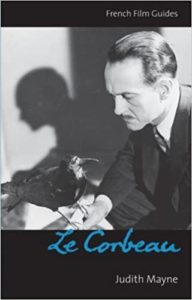 This is cheating a little because the book is largely an excuse for me to talk about the film. But the rules do state that any book is acceptable so onward we march. Credit where it’s due, Judith Mayne’s work deftly analyses Le Corbeau’s deeply compelling darknesses and guides the reader through its manifold possible interpretations—the film standing, as it does, as one of the most important pieces in the cinema of paradox.
This is cheating a little because the book is largely an excuse for me to talk about the film. But the rules do state that any book is acceptable so onward we march. Credit where it’s due, Judith Mayne’s work deftly analyses Le Corbeau’s deeply compelling darknesses and guides the reader through its manifold possible interpretations—the film standing, as it does, as one of the most important pieces in the cinema of paradox.
While nominally about a small French town gripped in the hysteria of a spate of poison pen letters (actually based on a true story in 1920s rural France), Henri-Georges Clouzot is not really examining these events. He is, instead, telling a story about the German occupation of France while exploring the mechanics of informing on your neighbour. It’s particularly fascinating considering he produced the movie for Continental Films, founded by Goebbels himself. After the war, Clouzot would be banned for life from the industry as a Nazi collaborator, though this would be overturned in favour of a two-year interdiction after much campaigning by the likes of Sartre.
This despite the fact Goebbels himself would telegram Clouzot after viewing the film, furious that, while Le Corbeau was a work of genius, it was subversive, and it might make France think for itself. You are paid to make empty films, Goebbels pointedly reminded him.
Upon its release, the Catholics would decry it for its sexual themes and open depiction of abortion, while the Communists would reject Le Corbeau for its unheroic characterisation of France. As Bertrand Tavernier would say in a 2002 interview, Clouzot made a film about the truth. But sometimes, some things are too true. Though banned for decades, its cultural impact remains undeniable. To this day, the French word corbeau—raven—is understood to mean someone who writes anonymous letters with intended malfeasance.
I first saw the film with my French grandmother, whose own mother was a member of the French Resistance throughout the war. On her birthday each year she would receive a letter from the President of the Republic in thanks. (“He won’t bloody leave me alone,” she would always say with a wink). They were both from a tiny village near the Dordogne and the politics and cruelties of small-town gossip are absolutely captured in Le Corbeau.
It’s a sumptuous film, full of hypocrisy, intrigue, and sexuality. Each shot is a charcoal sketch, and each character, no matter how minor, feels like a real person. But the reason this story will always stay with me is because it is, I think, my first memory of the figure of a detective.
As the plot races towards its noir-ish (before noir existed) conclusion and the identity of the true author of the poison pen letters is revealed, two doctors size each other up in an empty classroom (next door to where the local prosecutor is testing the handwriting of the 18 remaining suspects).
Doctor Rémy Germain, smooth-talking and handsome, philosophically clashes with the wily and colourful old psychiatrist, Doctor Michel Vorzet, whose young wife the former is having an affair with.
“Vile beast?” Vorzet smiles enigmatically. “But I see one in the mirror each morning, alongside an angel. You are amazing—you think that people are all good, or all bad. You think that good is the light, and that evil is the darkness…” Vorzet swings the lightbulb in front of his face, like a pendulum. “But where is the darkness? Where is the light…?” he falls into shadow, then back into light as his knowing smile is illuminated. “And do you know which side you’re on?”
This was not the moment I first knew I wanted to write books. But it is certainly the moment that I knew I wanted to write detective stories.
1990s—Out by Natsuo Kirino
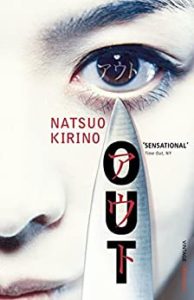 Sometimes you love something so much it’s hard to elucidate. For me, Out is one such love. Originally published in 1997, the novel was translated in 2004 and promptly nominated for an Edgar (Kirino would lose out to Rankin’s Resurrection Men). While Rebus has obviously stood the test of time, for me, Out is one of the finest mystery novels—not just of 2004/1997—but of the entire modern canon. (Even the title of the book is a work of economical genius).
Sometimes you love something so much it’s hard to elucidate. For me, Out is one such love. Originally published in 1997, the novel was translated in 2004 and promptly nominated for an Edgar (Kirino would lose out to Rankin’s Resurrection Men). While Rebus has obviously stood the test of time, for me, Out is one of the finest mystery novels—not just of 2004/1997—but of the entire modern canon. (Even the title of the book is a work of economical genius).
Sparse, poetic, kinetic, darkly hilarious, and utterly claustrophobic, it’s a masterclass in the crafting of domestic mystery and how one split second can change lives forever. On paper, it’s about four women working nights at a factory, the murder of an abusive husband in self-defence, and divvying up insurance money in exchange for sworn silence. Taken in isolation, that could sound like an episode of The Bill. But through it, Kirino trains her large magnifying glass on jealousy, loneliness, class structure, lust, misogyny, hatred and, ultimately, the desperation of what it is to be a woman in an empty suburban existence — all of it set against a backdrop of Japan’s economic downturn. Of course, these aren’t small themes. Yet one of Kirino’s many gifts is her ability to effortlessly condense the macro to the micro, entire existences understood in two lines:
“When stones lying warm in the sun were turned over, they exposed the cold, damp earth underneath; and that was where Masako had burrowed deep. There was no trace of warmth in this earth, yet for a bug curled up tight, it was a peaceful and familiar world.”
As a 19-year-old dreaming about my own novel one day, Kirino lit a fire in the dark for me. Not just in terms of her exquisitely realised Tokyo. But her ability to birth characters with secrets and fears—inner worlds that threaten to spill out into the external.
1980s—The Silence of the Lambs by Thomas Harris
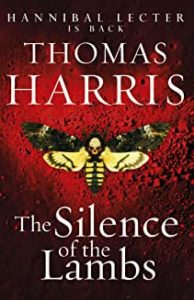 This entry was a hair’s breadth from being Gorky Park by Martin Cruz Smith, particularly as a shining exemplar of an author writing outside of their native geography and culture which, later on, would be so important to me.
This entry was a hair’s breadth from being Gorky Park by Martin Cruz Smith, particularly as a shining exemplar of an author writing outside of their native geography and culture which, later on, would be so important to me.
But in the end, those bloody lambs just won’t shut up. The way I see it, there are crime novels and then there’s the Silence of the Lambs. In Clarice Starling, Harris created one of the most interesting heroes in any genre, with an irresistible character arc that would give rise to a million scriptwriting workshops (and, in the collective psyche, pair liver with a nice Chianti forevermore).
Now, before I go on to glorify the book, I do want to say that I am, of course, aware of the controversy surrounding its depiction of transgenderism. While poorly-equipped to contribute to that conversation, I do feel it’s important Hannibal Lecter explicitly states in the story that Wild Bill is not, in fact, transgender. Still, I absolutely understand that any representation of transgenderism as some kind of vaudevillian freakshow is less than helpful, particularly if platformed by powerful voices. Still, if intent matters at all, I don’t believe Harris ever set out to do such a thing. With all that said, I’m yet to hear of a single detractor of the book for its quality.
It is, simply put, a masterwork. And while this taut, elegant novel spills over with suspense and narrative chicanery, it’s the characters that really set it apart. Unforgettable is an over-used word but the much-loved psychological chess game between Starling and the charming but diabolical archfiend, Hannibal Lecter, will live forever. So gripping is their relationship that it renders the actual antagonist of the story, Buffalo Bill, almost secondary.
As early as page 4, we are being warned about the nightmare to come. After all, Starling first hears of Lecter in the form of a warning:
“…It’s the kind of curiosity that makes a snake look in a bird’s nest… We both know that in interviews you have to back-and-forth a little but tell him no specifics. Starling, you do not want any of your personal facts inside his head.”
And, just like that, we know this is precisely what’s going to happen.
For my money, it should be a staple on creative writing courses everywhere. But as a young aspiring writer, what really illuminated me was the way Harris binds together the steadily rising stakes in the external world, with internal one building inside Clarice also.
1970s—One Hundred Years of Solitude by Gabriel García Márquez
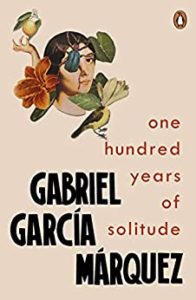 Originally published in 1967, Gabo’s magnum opus was translated into English three years later. (I’m aware I’m doing the opposite of what I did with Out—sorry for playing fast and loose with the rules, Gordon!)
Originally published in 1967, Gabo’s magnum opus was translated into English three years later. (I’m aware I’m doing the opposite of what I did with Out—sorry for playing fast and loose with the rules, Gordon!)
Just over a decade on, he’d be receiving the Nobel Prize, firmly established as a living, breathing Latin American Tolstoy or Cervantes. Today, Cien años de soledad stands as The White Album of magical realism, the very paragon of Latin American literature in its entirety, having sold some 45 million copies—almost the entire population of Colombia. Not for nothing does he grace the 50,000-peso bank note.
Studied, adored, and devoured all over the world, so many have written so richly on this magical (wink) book, it almost felt like too obvious a choice. But this being a list of books that influenced me, I simply cannot disregard Cien años. Of course, Gabo’s art for treating the supernatural as mundane is widely-studied but picking this book up at 13 or 14 years of age, I was utterly bewitched. Macondo, no matter what happens there, always feels real and lived in. Omens, curses, prophecies—all of it somehow feels possible in the world García Márquez weaves together. But beyond the what, is the how. Never before had I been so mesmerised by words. His use of language is always elemental, even for a simple background banality. Consider this description of a priest collecting for a new church:
“He went everywhere begging alms with a copper dish. They gave him a large amount, but he wanted more, because the church had to have a bell that would raise up the drowned to the surface of the water. He pleaded so much he lost his voice. His bones began to fill with words.”
It’s been said before but this book is life itself. As William Kennedy put it in a New York Times review: This is the first piece of literature since the Book of Genesis that should be required reading for the entire human race.
I encourage anyone reading this, whatever their stance on magical realism, to throw themselves at this book if they’re yet to experience it. I promise you, by the time you get to the end, you’ll scarcely believe it’s over. But long after it is, the words of Márquez will fill your bones too.
Each of my guests brings something new to the Library but I have been blown away by this contribution. My thanks to Nic for these wonderul selections. Every week I run one of these posts I wonder which books missed out – this week I don’t need to wonder as Nic has also shared some titles which narrowly missed out. These don’t get into the Library this week, maybe they will be selcted by someone else!
Honourable mentions from the cutting room floor:
Richard Yates — Eleven Kinds of Loneliness
Philip K. Dick — Do Androids Dream of Electric Sheep?
Truman Capote — In Cold Blood
David Mitchell — number9dream
Martin Cruz Smith — Gorky Park
Juan Pablo Villalobos — Down the Rabbit Hole
Anaïs Nin — Delta of Venus
Carson McCullers — The Heart is a Lonely Hunter
Junot Díaz — Drown
Ryu Murakami — In the Miso Soup
Haruki Murakami — Hardboiled Wonderland and the End of the World
John Hersey — Hiroshima
Donna Tartt — The Secret History
DECADES WILL RETURN
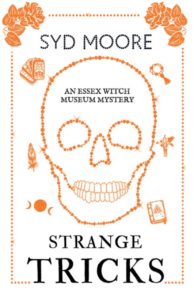 Secretly Rosie Strange has always thought herself a little bit more interesting than most people – the legacy her family has bequeathed her is definitely so, she’s long believed. But then life takes a peculiar turn when the Strange legacy turns out not just to be the Essex Witch Museum, but perhaps some otherworldly gifts that Rosie finds difficult to fathom.
Secretly Rosie Strange has always thought herself a little bit more interesting than most people – the legacy her family has bequeathed her is definitely so, she’s long believed. But then life takes a peculiar turn when the Strange legacy turns out not just to be the Essex Witch Museum, but perhaps some otherworldly gifts that Rosie finds difficult to fathom.






